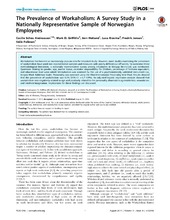The prevalence of workaholism: A survey study in a nationally representative sample of norwegian employees
Andreassen, Cecilie Schou; Griffiths, Mark D.; Hetland, Jørn; Kravina, Luca; Jensen, Fredrik Johan Broch; Pallesen, Ståle
Peer reviewed, Journal article
Published version
Permanent lenke
https://hdl.handle.net/1956/9067Utgivelsesdato
2014-08-13Metadata
Vis full innførselSamlinger
Originalversjon
https://doi.org/10.1371/journal.pone.0102446Sammendrag
Workaholism has become an increasingly popular area for empirical study. However, most studies examining the prevalence of workaholism have used non-representative samples and measures with poorly defined cut-off scores. To overcome these methodological limitations, a nationally representative survey among employees in Norway (N = 1,124) was conducted. Questions relating to gender, age, marital status, caretaker responsibility for children, percentage of full-time equivalent, and educational level were asked. Workaholism was assessed by the use of a psychometrically validated instrument (i.e., Bergen Work Addiction Scale). Personality was assessed using the Mini-International Personality Item Pool. Results showed that the prevalence of workaholism was 8.3% (95% CI = 6.7–9.9%). An adjusted logistic regression analysis showed that workaholism was negatively related to age and positively related to the personality dimensions agreeableness, neuroticism, and intellect/imagination. Implications for these findings are discussed.

